Key Elements for CV Successful
Introduction
In the competitive job
market of today, a well-crafted Curriculum Vitae (CV) is an indispensable tool
that can make or break your chances of landing your dream job. A CV serves as
your professional introduction to potential employers, showcasing your qualifications,
experiences, and skills. This article will explore the essential components of
a CV, focusing on the differences between the CVs of fresh graduates and
experienced professionals.
- Contact Information
The foundation of any
CV lies in accurate and updated contact information. Include your full
name, phone number, email address, and LinkedIn profile (if applicable). Ensure
that this information is easy to locate and error-free, as it forms the first
impression employers have of you.
- Personal Statement (Personal Profile)
The Personal
Statement, also known as the Personal Profile or Objective, is a concise
paragraph that introduces you to prospective employers. Fresh graduates should
highlight their academic achievements, enthusiasm, and eagerness to contribute,
while experienced professionals should emphasize their accomplishments,
expertise, and the value they bring to a potential employer. Tailor this
section to align with the specific job you're applying for.
- Work Experience
a. Fresh Graduates:
Emphasize internships, part-time jobs, or any relevant volunteer experiences.
Highlight transferable skills gained during studies and extracurricular
activities. Use action verbs to describe responsibilities and achievements,
even if they aren't directly related to the target job.
b. Experienced Professionals:
Detail your work history, starting with the most recent job.
Emphasize accomplishments, responsibilities, and any promotions. Quantify
achievements wherever possible, using metrics to showcase the impact of your
work. Tailor this section to showcase relevant experience for the position
you're applying for.
- Education
a. Fresh Graduates:
Highlight your academic achievements, including your degree, major, university,
and graduation date. If you have a high GPA or any relevant coursework or
projects, include them. Mention any academic honors or awards received.
b. Experienced Professionals:
Mention your educational background but prioritize work
experience. Include any relevant certifications, workshops, or professional
development courses you've completed since graduation. Focus on demonstrating
ongoing commitment to learning.
- Skills
a. Fresh Graduates:
Showcase
a mix of hard and soft skills acquired through education, internships, and
extracurricular activities. Highlight skills such as teamwork, communication,
problem-solving, and any software or tools you're proficient in.
b. Experienced Professionals:
Demonstrate a balance of technical and leadership skills gained
through years of experience. Include industry-specific skills, certifications,
and any specialized training. Showcase your ability to adapt to evolving
technologies and industry trends.
Key Factors for Fresh Graduate CV
Creating an effective
CV as a fresh graduate requires emphasizing your education, relevant skills,
and any practical experiences you may have gained during your academic journey.
Here are key factors to consider when crafting a CV for a fresh graduate:
Contact Information:
- Include your full name, phone number, email address, and LinkedIn profile (if applicable).
- Ensure that your contact information is accurate and professional.
Personal Statement:
- Craft a concise personal statement that highlights your enthusiasm, career objectives, and key skills.
- Showcase your eagerness to contribute and learn in a professional setting.
Education:
- Highlight your academic achievements, including your degree, major, university, and graduation date.
- Mention any relevant coursework, projects, or academic honors.
Skills:
- Emphasize a mix of hard and soft skills that are relevant to the job you're applying for.
- Include skills gained through coursework, internships, and extracurricular activities.
- Showcase your adaptability and willingness to learn new skills.
Work Experience (if applicable):
- Include internships, part-time jobs, or volunteer experiences.
- Emphasize responsibilities and achievements, even if they aren't directly related to the target job.
- Use action verbs to describe your contributions.
Extracurricular Activities:
- Highlight any leadership roles, club memberships, or volunteer work.
- Showcase activities that demonstrate teamwork, communication, and problem-solving skills.
Projects and Coursework:
- Include any relevant projects or coursework that demonstrate practical application of your skills.
- Highlight group projects to showcase teamwork and collaboration.
Relevant Certifications or Training:
- Include any certifications or training programs that are relevant to the job.
- Showcase your commitment to continuous learning and professional development.
Professional Development:
- Mention any workshops, seminars, or conferences you've attended.
- Highlight any efforts to stay updated on industry trends and advancements.
References:
- If possible, include references or mention that they are available upon request.
- Choose individuals who can speak to your academic or professional capabilities.
Formatting and Style:
- Keep the CV well-organized, using clear headings and bullet points for easy readability.
- Use a professional and consistent font throughout.
- Keep the CV to a reasonable length (typically one page for a fresh graduate).
Tailoring for Each Application:
- Customize your CV for each job application, emphasizing the most relevant skills and experiences.
- Research the company and role to align your CV with their specific requirements.
Remember that a fresh
graduate CV is an opportunity to showcase your potential and willingness to
learn. Focus on presenting a well-rounded picture of yourself, emphasizing how
your education and experiences have equipped you with the skills necessary for
the job you're seeking.
Conclusion
In conclusion, a
well-structured CV is essential for making a positive impression on potential
employers. Whether you're a fresh graduate or an experienced professional,
tailoring your CV to the specific job you're applying for is crucial. By
including key elements such as contact information, a compelling personal
statement, comprehensive work experience, educational background, and a diverse
set of skills, you can increase your chances of standing out in a competitive
job market. Remember, your CV is not just a document; it's your personal
marketing tool, showcasing your unique qualifications and setting you on the
path to professional success

